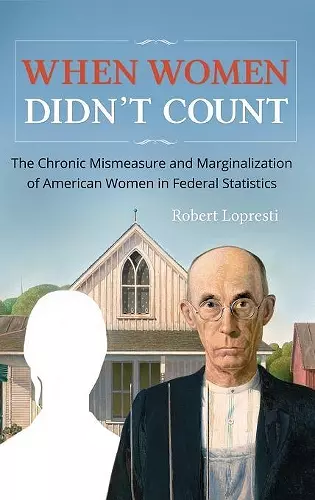When Women Didn't Count
The Chronic Mismeasure and Marginalization of American Women in Federal Statistics
Format:Hardback
Publisher:Bloomsbury Publishing PLC
Published:22nd Jun '17
Currently unavailable, and unfortunately no date known when it will be back

Erroneous government-generated "data" is more problematic than it would appear. This book demonstrates how women's history has consistently been hidden and distorted by 200 years of official government statistics. Much of women's history has been hidden and filtered through unrealistic expectations and assumptions. Because U.S. government data about women's lives and occupations has been significantly inaccurate, these misrepresentations in statistical information have shaped the reality of women's lives. They also affect men and society as a whole: these numbers influence our investments, our property values, our representation in Congress, and even how we see our place in society. This book documents how U.S. federal government statistics have served to reveal and conceal facts about women in the United States. It reaches back to the late 1800s, when the U.S. Census Bureau first listed women's occupations, and forward to the present, when the U.S. government relies on nonprofit groups for statistics on abortion. Objective and accurate, When Women Didn't Count isn't focused on numbers and census results as much as on recognizing problems in data, exposing the hidden facets of government data, and using critical thinking when considering all seemingly authoritative sources. Readers will contemplate how the government decided that a "farmer's wife" could be a farmer, how the ongoing battle over abortion has been reflected in the numbers the government is allowed to keep and publish, the consequences of the Census Bureau "correcting" reports of women in unusual occupations in 1920, and why the official count of women-owned businesses dropped 20 percent in 1997.
The author seeks . . . to provide, and does so quite compellingly, an examination of why certain questions were asked, which in turn then generated those numbers, and the ways in which those questions changed over time, thus shaping the representation of women within this official historical record. . . . . [I]t is especially intriguing to see how the author clarifies the impact of changing occupations and new technologies and how they affected women at work, and the need to be able to provide data to effect social change. . . . Summing Up: Recommended. All levels/libraries. * Choice *
Some questions have no accurate answers. This is especially true of government statistics on women, as Lopresti demonstrates this beautifully in When Women Didn't Count. . His treatise on the subject is enlightening. . . . This book is an important work that sheds light on the sexism that permeates our statistics, even as recently as the last decade. * Documents to the People *
In nearly every chapter consumers of federal statistics can find important lessons, many of which make it clear that the 'hardness' of numbers often is illusory. . . . In a captivating and often humorous way, Lopresti's documentation of the 'mismeasuring' of women in federal statistics provides a succinct history of women's changing role in American society. * Population and Development Review *
- Winner of 2018 Margaret T. Lane/Virginia F. Saunders Memorial Research Award 2018
ISBN: 9781440843686
Dimensions: unknown
Weight: 822g
376 pages